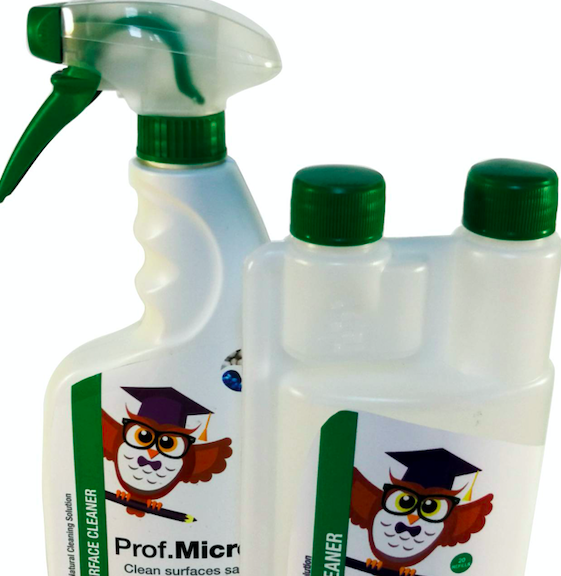Sunday Times Green
How Clean Is Green?
Environmentally-friendly cleaning products are a tricky area, says Chris Rafael of Orlichem. “There’s a lot of greenwashing that goes on, which clouds the real facts,” she points out. For instance, a product that’s biodegradable, and therefore environmentally-friendly, might actually be toxic to humans.
Colin Sham, CEO and founder of Beyond Green Cleaning South Africa and the registered trademark owner of Prof. Microbe, agrees. “A ‘green’ household cleaning product is biodegradable, sustainable and environmentally friendly, inflicting minimal or no harm to the environment. However, almost everything in the world eventually biodegrades – even [dangerous] chemicals break down.”
It’s not surprising, then, that the term is increasingly misused, potentially misleading consumers. Especially as the growing awareness of environmental issues means that many wily entrepreneurs are eager to jump on the green wagon, as Rafael observes.
One of the reasons this obfuscation remains possible is because of the lack of regulation and legislation: while various accreditations are available, there is no single overarching prescribed legislation or regulation for “green”, Sham says.
There are international guidelines regarding best practice for labelling green cleaning products – although South Africa has been slow to implement them. It’s also possible to conduct “cradle to grave” studies, which examine every area of a chemical’s impact, from its ingredients to how it’s made and how it biodegrades. But such studies are generally very costly, and Rafael says he has yet to encounter a South African body that can conduct such a thorough study. More often, research is restricted to the chemical’s impact on human health.
Just how effective are they?
The ambiguity surrounding the definition of “green” may be a reason consumers are sceptical, but many have more questions around the efficacy of such products, especially as they tend to be considerably pricier than their traditional counterparts.
Marc Du Chenne, MD of eco-friendly cleaning system GenEon Technologies, says that perception plays a big part here. “People think green doesn’t clean as well because these products typically don’t foam and they don’t have a strong smell. The reality is that these properties are created by additives that have no use, beyond catering to what we think a detergent ‘should’ be like,” he explains.
“As much as these additives may add to the appeal of traditional products, they are also the reason why such products may be harmful: solvents added to boost the cleaning process, like ammonia, may have a corrosive effect over time, and may also cause respiratory problems in children and adults,” he continues.
Moreover, fragrances can cause allergies, Du Chenne warns. The takeout? Green products may require a longer cleaning time and a bit more elbow grease, but it’s worth the effort.
Sham says that it’s also worth investigating all-natural products that don’t merely transport dirt from your countertop to your drain, but also dissolve it completely. They’re considered as powerful as traditional cleaners.
Growing the market
Du Chenne says that South Africa’s market for green products is small yet growing. We have some way to go before demand for green reaches the proportions of, say, Europe, but this is likely to change as awareness of the benefits of environmentally-friendly products grows.
“The greatest barrier to trial is brand loyalty and resistance to trying a new product, as well as the belief that traditional products do a better job,” Du Chenne comments. He believes that such challenges could be overcome through education initiatives and support from retailers – simply stocking the shelves with green products may be an incentive for consumers to try the product.
In the meantime, Sham recommends looking out for products carrying the Global GreenTag, a widely trusted label.
“There may be no such thing as the perfect green product, but you can always look for the one that’s ‘greener’,” says Rafael. “How you use such products also makes a difference: you can minimise your environmental impact by using cleaning chemicals as you would an antibiotic; sparingly, and only when you need them.”





